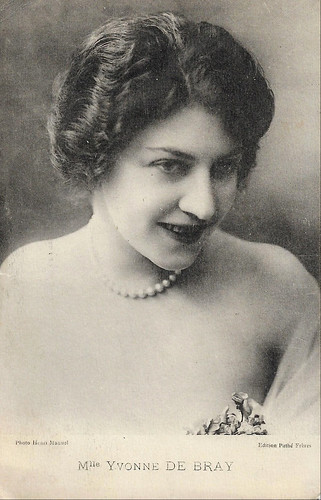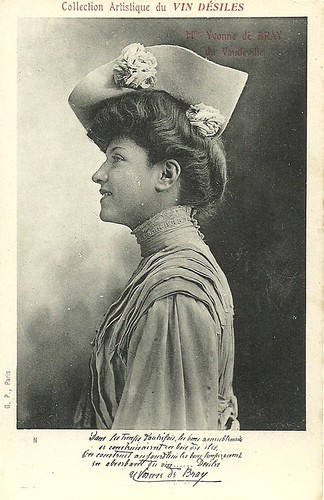
French postcard by Edition Pathé Frères. Photo: Henri Manuel.

French postcard in the Collection Artistique de Vins Désiles series by Ruckert & Cie. Photo: P. Berger.
Struck by lightning
Yvonne Laurence Blanche de Bray was born in 1887 in Paris. Already as a child, Yvonne de Bray started her career on stage alongside two famous 'monstres sacrés' of the French stage, Gabrielle Réjane, and Sarah Bernhardt.
When she was 15, she married a journalist but the marriage lasted only 3 years. Her real stage debut she had in 1907 in 'Le ruisseau' by Pierre Wolf. After that, she played in comedies such as 'Trains de luxe' by Abel Hermand in 1909 and 'Papa' by the fashionable duo Flers and Caillavet in 1911.
The same year, she met poet and playwright Henry Bataille (1872-1922) and was struck by lightning. For ten years, they remained a couple, living in Rueil-Malmaison. She performed on stage in tailor-made plays by her husband, such as 'La phalène' (1913), 'La tendresse' (1921) and 'La possession' (1921).
As Daniel Chocron writes on the site CinéArtistes, while afterwards denigrated, Bataille's plays had underneath their lightness a serious critique of society and morality regarding the situation of women versus men in the world of the bourgeoisie and aristocracy. In 1922, De Bray left the stage, devastated after the death of her husband.
She later starred again in two Bataille plays, 'La tendresse' in 1924 and 'L’animateur' in 1926. In 1927, she played in 'Le venin' by Henri Bernstein and in 1937 in 'Catherine Empereur' by Maurice Rostand. For several years Yvonne de Bray would be the lover of the former sports champion Violette Morris (1893-1944), who helped De Bray with her dipsomaniac alcoholism.

French postcard in the Les Reines de la Mode series by Croissant, Paris, no. 3375. Photo: Saul Boyer.

French postcard by Imp. H. Bouquet, Paris. Photo: Waléry, Paris. Caption: Yvonne de Bray dans le rôle de Hélène Miran-Charville, Le Coeur dispose, Comédie en 3 Actes de Francis de Croissey. Théâtre de l'Athénée, Paris.
Les monstres sacrés
Jean Cocteau saw her in 'Catherine Empereur' and invited her to perform in his play 'Les parents terribles' the role of Sophie, which he had written especially for her. Her alcohol problem prevented her from performing, so Germaine Dermoz got the part.
In 1939, De Bray and Violette Morris invited Jean Cocteau, whose lover Marais was then mobilised, to stay with them at their houseboat docked at Pont de Neuilly. There he wrote the three-act play 'Les monstres sacrés' in which De Bray and Morris would act in 1940. The play was a success.
But during the war, her relationship with Morris collapsed and the latter, deluded in life, would collaborate with the Nazis and would be shot by the French Resistance in 1944 even if no proof of Morris' collaboration has ever resurfaced in archives.
From 1943 Yvonne de Bray acted in the cinema, such as in Jean Delannoy's L'éternel retour/The Eternal Return (1943) with Madeleine Sologne and Jean Marais.
In 1948, she would be Sophie in Cocteau's film adapted from his play, Les parents terribles (Jean Cocteau, 1948), opposite Jean Marais as Michel, Josette Day as Madeleine, and Gabrielle Dorziat as Léo.

French postcard by F.C. et Cie, no. 16. 9. Photo: Manuel.

French postcard in the Collection Artistique de Vins Désiles by G.P., Paris, no. 8.
A landmark in the lesbian cinema
After the war, Yvonne de Bray appeared in Jean Cocteau's L'Aigle à deux têtes/The Eagle with Two Heads (1948) starring Edwige Feuillère and Jean Marais, and two films based on the novels by Colette, Gigi (Jacqueline Audry, 1948) with Gaby Morlay and Chéri (Pierre Billon, 1950).
During the 1950s she appeared in Olivia/The Pit of Loneliness (Jacqueline Audry, 1950) - a landmark in the lesbian cinema, Nous sommes tous des assassins/We Are All Murderers (André Cayatte, 1952) with Marcel Mouloudji, and Quand tu liras cette lettre/When You Read This Letter (Jean-Pierre Melville, 1953) starring Juliette Gréco and Philippe Lemaire.
Forty years earlier, De Bray had acted in two silent shorts, Les fiancés de Miss Maggy (?, 1909) and the Pathé production Le poison du Professeur Rouff (René Leprince, 1911), but there may have been more early films.
At the theatre, De Bray performed not only with Cocteau. She also played in Jean Giraudoux's 'Pour Lucrèce' (1953), directed by Jean-Louis Barrault at the Théâtre Marigny.
Yvonne de Bray died in 1954 in Paris, at the age of 66. She was buried at the cemetery of Père-Lachaise.

French postcard by A.N., Paris, no. 23. Photo: Manuel Frères.
Sources: Daniel Chocron (CinéArtistes - French), Ciné-Ressources (French), L'encinémathèque (French), L'info sans masque (French), Wikipedia (French and English), and IMDb. With additional information from Marlene Pilaete.
This post was last updated on 26 March 2023.
These are lovely Paul. What an amazing woman she was... talented, beautiful and what a powerful life story! I have a vague memory of seeing the movie you mentioned about the space ship running into the eye of the moon... I'm going to have to look it up now! :D Have a great week yourself, my Friend. :D
ReplyDelete